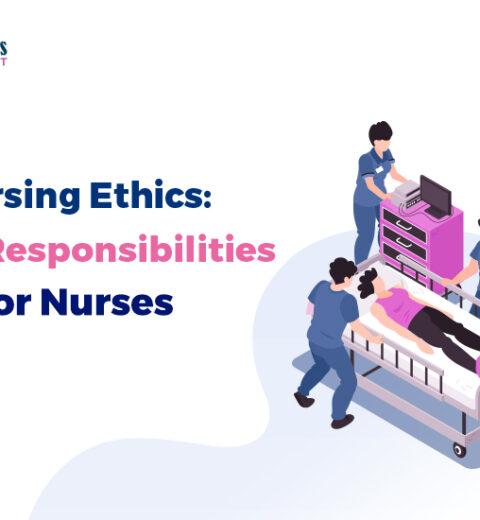Introduction
The healthcare business is experiencing a critical shortage of qualified staff, including doctors, nurses, and support employees. This shortage is a big concern for healthcare organisations since it can have an impact on patient care and outcomes.
The UK will require an additional 50,000 nurses by 2024 to meet demand, according to a report from the Royal College of Nursing. The research suggests that this be done by expanding the number of nursing graduates by at least 8,000 per year. The healthcare industry can deal with staffing shortages and guarantee high-quality patient care by expanding the number of nursing graduates and investing in their training and education.
In this blog post, we will analyse the causes of healthcare staffing shortages and offer some solutions to this problem.
What are the Causes of Staffing Shortages in Healthcare?

Staffing shortages in healthcare are a growing concern globally. There are various factors that contribute to this issue, including demographic changes, lack of investment in healthcare institutions, competition for talent, burnout, and turnover. As populations age, the demand for healthcare services increases, putting more strain on already limited resources. Let’s see the crucial ones in detail below.
Aging Population
The aging population contributes significantly to the healthcare workforce shortfall. As the baby boomer group matures, there will be greater demand for healthcare services, resulting in a shortage of people to offer care.
Low Pay and Benefits
Lack of staffing in the healthcare industry is largely caused by low pay and benefits. Healthcare professionals frequently need substantial education and training, but they might not get paid enough or have the benefits they need to match their level of skill and commitment.
As a result, employees may experience significant levels of turnover as they look for jobs with better pay. Additionally, long hours and stressful workplaces may cause significant levels of stress and burnout in healthcare employees, aggravating the already acute scarcity of qualified staff.
High Stress and Burnout
Healthcare workers’ high levels of stress and burnout may also be a factor in staffing shortages. Long hours and the demanding nature of the work can wear people out physically and mentally, forcing them to quit their jobs or work fewer hours.
Lack of Training and Education
A lack of training and education is a major contributing factor to staffing shortages in healthcare. Healthcare professionals require specialized knowledge and skills to care for patients effectively.
When institutions don’t invest in employee development, staff may become dissatisfied and leave for better opportunities. Additionally, a lack of training can result in decreased productivity and effectiveness, putting patient safety and care quality at risk. Healthcare institutions must prioritize employee training to attract and retain the best talent and ensure high-quality patient care.
What are the Solutions for Staffing Shortages in Healthcare?
To address staffing shortages in healthcare, there are several potential solutions, including increasing wages and benefits to attract and retain qualified staff, investing in training and education to improve employee skills and job satisfaction, utilizing technology and automation to improve efficiency and productivity, and expanding healthcare infrastructure to meet growing demand.
Let’s see all of them in detail in the below section.
Increase Pay and Benefits

Increased pay and benefits for healthcare professionals are one solution to staffing shortages in healthcare. This can attract more skilled people to the industry while decreasing turnover.
Improve Working Conditions
Improving working conditions can also help to address healthcare workforce shortages. A supportive and healthy work environment can minimise stress and burnout, resulting in happier staff.
Use Locum healthcare Recruitment agencies

Locum healthcare recruitment agencies can provide temporary staff to quickly and easily fill staffing gaps, addressing healthcare staffing shortages. They can also provide additional support during busy periods. While more expensive than hiring permanent staff, using locum agencies can be a valuable short-term solution.
Increase Training and Educational Opportunities
Expanding education and training options for healthcare workers can attract new talent and increase staff expertise, addressing staffing shortages. Healthcare institutions can invest in these programs to improve employee job satisfaction and quality of care.
Use Technology to Enhance Efficiency
Increasing efficiency through technology can also aid in addressing the healthcare industry’s personnel problem. The use of telemedicine, for instance, can lessen the need for in-person consultations, giving medical staff more time to concentrate on complex patients.
Conclusion
A multifaceted approach is necessary to address the complicated problem of staffing shortages in the healthcare industry. Healthcare organisations can recruit and keep more qualified individuals to deliver high-quality patient care by raising compensation and benefits, enhancing working conditions, offering more opportunities for training and education, and employing technology to increase efficiency.
FAQs
Why is there a staffing shortage in healthcare?
- The healthcare industry is experiencing a personnel crisis as a result of issues like an aging population, poor pay and benefits, high stress and burnout levels, and a lack of possibilities for training and education.
What is the impact of staffing shortages on patient care?
- Because overworked healthcare personnel may not be able to provide patients with the time and care they require, staffing shortages in the industry can result in a decline in the quality of patient treatment.
How can healthcare organizations attract and retain skilled professionals?
- By raising compensation and benefits, enhancing working conditions, offering additional possibilities for training and education, and utilising technology to increase efficiency, healthcare organisations can attract and keep qualified people.
What is the role of technology in addressing staffing shortages in healthcare?
- Healthcare personnel shortages can be greatly helped by technology. It can enhance patient care, boost efficiency, and improve communication among healthcare workers. Healthcare providers may reach more patients, for instance, without adding more employees, thanks to technologies like telemedicine and remote monitoring.
What are the long-term implications of staffing shortages in healthcare?
- Healthcare staffing shortages can lead to decreased quality of care, higher risk of staff burnout and turnover, and increased healthcare costs.
How can individuals help address staffing shortages in healthcare?
- Individuals can contribute to addressing healthcare staffing shortages by supporting policies that improve working conditions and remuneration for healthcare workers. They can also volunteer at healthcare facilities or pursue professions in healthcare. Individuals can also take initiatives to encourage healthy lifestyles and preventative care in order to lessen the need for healthcare services.
Are staffing shortages in healthcare a global issue?
- Yes, staffing shortages in healthcare are a global issue affecting many countries around the world. The causes and extent of the shortages vary by region, but the consequences are often similar, including decreased quality of care, increased workloads for existing staff, and higher healthcare costs. The COVID-19 pandemic has also highlighted and exacerbated healthcare staffing shortages in many countries.
What can governments do to address staffing shortages in healthcare?
- Governments can address healthcare staffing shortages by increasing funding for education and training programmes, providing financial incentives to attract and retain healthcare professionals, and enacting policies to improve working conditions and job satisfaction for healthcare workers. Furthermore, governments might fund research to better understand the causes and implications of workforce shortages, as well as to find effective solutions.
What is the role of healthcare organizations in addressing staffing shortages?
- Healthcare organizations can address staffing shortages by providing a supportive work environment, education and training opportunities, and competitive compensation and benefits packages. They can also develop partnerships with educational institutions and utilize technology and innovative staffing models to optimize existing staff and improve efficiency. Collaboration with the government and advocacy for policy change is also important.
How can we ensure that healthcare professionals are adequately prepared for the demands of their jobs?
- To prepare healthcare professionals for the demands of their jobs, they need ongoing education and training tailored to their roles and the evolving healthcare industry. Healthcare organizations and educational institutions can provide these opportunities while promoting work-life balance and well-being.






